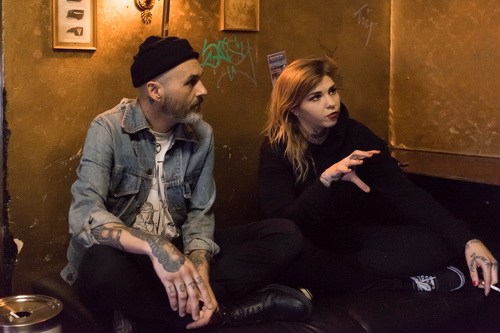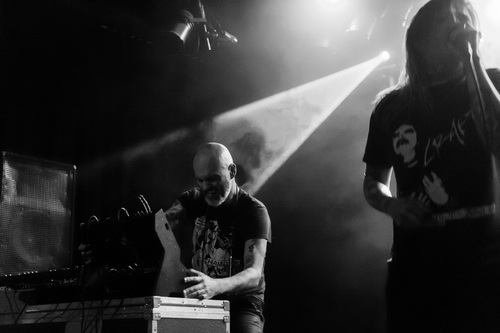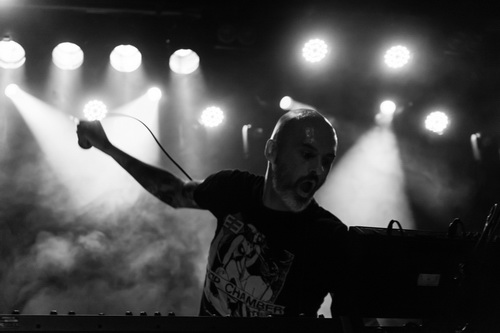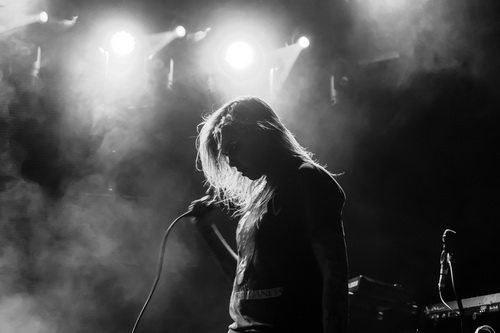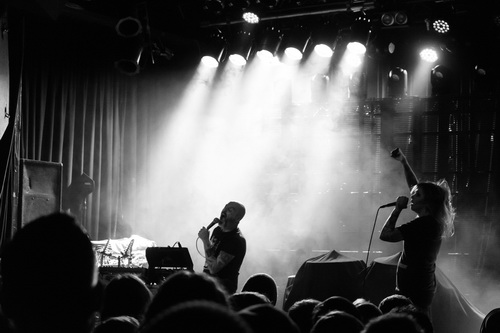
Punks on the EBM scene – Release sat down with Youth Code
Posted In Interviews,Slider by Jimi Nilsson
American EBM act Youth Code is continuing their two year-long tour with latest album “Commitment to Complications” with yet a new headliner, in yet a new music scene. After supporting acts as metal band Baroness, post metal act Deafheaven and, for Release readers, well known industrial act Skinny Puppy, Youth Code is back in Europe. This time with the major synthwave act Carpenter Brut, a tour that, however, kicked off with two shows supporting Front 242.
Release writer Jimi Nilsson and photographer Jule Roge met up with Youth Code before their show in Hamburg to get insight into their unusual background in the hardcore/punk scene, how it is to support such completely distinct acts in disparate music scenes and the sound of the next album. This is our second Youth Code interview.
New album, new collaborations?
Your last studio album “Commitment to Complications” was released in 2016 and you have the Chelsea Wolfe remix of “Lost at Sea” from last year. Are you working on a new album at the moment and will it be out in the near future?
Sara Taylor (ST): Yes, but we can’t say when because we don’t know (laugh). We still working on everything right now and it’s been hectic. I’m sure that anyone that does music knows that, especially with something as underground what we’re doing, you want to try to show as many people as possible the kind of stuff that you’re doing.
We’ve been touring for two years at this point on this record – over two years because we started touring before the record even came out. We’ve been touring, touring, touring, and when you’re gone from home for, you know, nine months out of the year it’s kind of hard to sit and write. If we had a bus maybe it would be easier to write, but this is our first tour ever on a bus. The last two years we’ve been sitting in vans, getting up at eight o’clock in the morning, driving to the next city – and you don’t really have time to write. When you get home for a month, or two months or something, all you want to do is play with your dogs and not be travelling and not be thinking about music.
Ryan George (RG): We usually don’t even unpack our equipment until three weeks after we have been home, it just sits in the living room in crates or road cases. When you’re on tour you just make sure that you can prepare yourself for every single night that is ahead of you. Your energy is so much more focused on trying to win over all this different audiences that you’re playing; writing something new isn’t what the challenge is. In that moment it is like “How do I convince this person who is into Carpenter Brut or Tribulation or Baroness or Chelsea Wolfe”, or all these different types of bands and people we are playing with, that we are also something that they should listen to?”.
That’s a striking feature of Youth Code, the great variety of bands and music styles you have been supporting. Haven’t you considered to collaborate with some of these tour bands beyond remixes?
RG: We had a lot of talk about that but we really need to concentrate on our next record before we do anything. I mean, we have so many potential projects, and things with so many great artists that we can’t really talk about. If we say it nothing will happen for two years. But there’s been a lot of talking. It’s weird, our band gets supported a lot by other bands and that’s why we go out on tour with such different bands – it’s really cool.
ST: I think also there is room for collaboration to a certain extent, like on the last record we had Todd Jones from Nails playing guitar on it, Ben Falgoust from Goat Whores sing a song on it, Josh Eustis from Telefon Tel Aviv produced our EP and stuff, and Rhys Fulber from Front Line Assembly helped to put together “Commitment to Complications”.
RG: There is weird pockets where you could get other people to work with you, but we’re more focused on doing the next Youth Code record and we might bring friends into it. A lot of people have asked to be on the next record but we’re going to have to say no to some of it or it’s going be a lot of cooperations, like Youth Code with friends (laugh). There are so many people that want to do stuff and it’s great, it feels good.
One happy couple
Speaking of new music; your latest album “Commitment to Complications” has a much tougher sound than your debut album from 2014. Will the next album take another step, to the next level of raw toughness? For instance, considering your punk/hardcore roots, will you bring in guitars?
RG: No, probably not. We’ve kind of messing around processing them, mostly conceptually like thinking about it and “How would I do this, how would I cut it up” – doing something different with it. I’m not opposed to use instruments to make sounds but we’ve talked a lot about adding other people to our band and I just don’t see it happening. As much as I sometimes wish that we would, I also really like the challenge of being the two of us and some synth shit on a table and just fucking the room up with two people because it makes people think.
I think it’s maybe more common in Germany where they see you as a two-piece. Electronic music happening in America – it’s a really weird thing. People don’t understand but have started to grasp it because more people are getting into electronic music in the states now, but when we started the band we were like a freakshow, especially with the bands we were playing with. We toured with hardcore and metal bands and played to really big rooms and people were just being like “What the fuck” and in the end they were like “I fucking loved it”. That’s kind of the goal for us.
ST: I think on the record we’ve done stuff, like real drums that we cut up and sampled, and real guitars – we have done stuff like that and there might be more of it, I don’t know at the time. It depends on what I feel that the song needs. But there has been a lot of thought about that.
Plus that touring just the two of us and bringing a couple of friends out on tour with us is so much easier. I don’t think that people think of what touring entails. A lot of people are like “Being in a band is cool” but having five or six people around you at all points in time – that sucks. I’m so much happier with just having us and I know that the creative process is us. We can look to each other on stage, it feels really powerful to me. If there were someone else I don’t really know that it would be the dynamic that I’ve grown to love. At this point, we’ve done this for so long as a two-piece. I think if we were to add another person or people it would become a different band.
EBM and different cultures
Being an EBM band rooted in old school European EBM in the North American music scene is however about taming a tough task. Considering that the scene at large is made up of industrial bands coated in heavy electronic soundscapes, such as Skinny Puppy and Front Line Assembly, or more guitar based acts as Nine Inch Nails, Ministry and Fear Factory, it takes a lot of effort to become accepted in the scene.
When thinking of the American electronic scene, it is often made up of harsh electronic music, in particular industrial music if considering bands like Canadians Skinny Puppy and Front Line Assembly– very often with guitar elements. You certainly have elements of an industrial sound and follow the tradition but mix it with traditional European old school EBM. Your FB site even declare that the main influence is “Muscle & Hate” – a clear reference to Nitzer Ebb. How does the audience respond to this mix of EBM cultures when you perform on American soil, which is more guitar based?
ST: The EBM scene in America is small to non-existent. You can play bigger cities like New York, San Francisco, Chicago, Los Angeles but when we first started doing Youth Code I don’t think it was a hip and cool thing to be into EBM. I’m speaking just for Los Angeles and of younger kids. There has always been people that have been into it for a long time that recognize the pieces of that culture that we bring into our music, but when we started there wasn’t a lot of younger people doing it – they didn’t even know what it was. I think there is more and more that are into it but it’s still really small.
It was weird five years ago if you talked to people younger than I am about Front Line Assembly, a lot of them didn’t know much about it. People knew about the obvious big ones like Nine Inch Nails, the biggest of the American industrial bands, and I guess they know about Ministry, but they knew more about traditional stuff. I was going out to clubs and listened to a lot of obscure stuff like Jäger 90 – nobody knows about that sort of thing (laugh). It’s cool to start to see people getting more and more into it. There were little bands that had influence too, like Tense and White Car. Those were bands that started up before us that had a traditional EBM sound to them but now it’s more poppy even it’s still really small.
RG: It’s more like a hip crowd listening to it, like an elite, you know “I go to clubs, I do drugs, I listen to this music” (laugh).
ST: If you go to like Kansas City on tour or if go to New Mexico or something like that and you ask someone if there is a goth club they will laugh like these things don’t exist in their world (laugh).
But how does it work out in Europe where the EBM tradition is much stronger, considering clubs and a general knowledge of bands although people never have listened to them?
RG: It is different! This tour is not the best example of it but when we’ve been here before on tour it has been really good. You know, we played the Wave Gotik Treffen and there is nothing like that in America. To have this festival with four days of EBM, industrial-electronic and all that stuff and you’re playing to all these people that, even if they haven’t heard us, are familiar with the type of influences you’re coming in from. When we play festivals in the States it is like “You guys are really like weird, gothic, yelling people” (laugh). It’s just two completely different things.
From the hardcore and metal world
Ryan’s history in the hardcore scene, being the lead singer of hardcore band Carry On and later V2-signed The Adored, and Sara’s wide experience of going on tours with metal bands doing merchandise and tour management in general, are quite unusual entry points into the EBM scene. Also, the onstage image of Youth Code, their embodiment of their music, is coated in a raw punk/hardcore attitude.
You differ quite much in visual appearance compared to many EBM bands and have much more of a punk/hardcore attitude on stage at least according to my experience of the punk scene. And I know that you, Ryan, have a background in punk and hardcore music. How did you end up in the electronic music scene?
RG: I got into electronics because I was in a band and got kicked out and I’ve never played an instrument before. I was singing in a band and got kicked out of the band and I was really angry about it and I was like “I’m going to buy a guitar and I’m going to learn to play”. I got the guitar and I was like “Jeez, how do I keep time; I can buy a metronome or a drum machine” and I ended up buying a Korg EM-1 which is a black drum machine which also has two synthesizer parts and a sequencer, and I didn’t know what that was (laugh). When I got it home I got way more into that than the guitar, and then I saw the midi cable port so I got a keyboard that took midi and I started going “Oh my God, I can fucking make whatever I want”.
I liked the industrial stuff even when I was younger and getting into punk so I started making stuff like that and make little songs like Depeche Mode type stuff, and I was just buying more and more electronics. Around that time we met and moved together in Los Angeles and Sara came home one day and said “We have a band”. I said “What are you talking about?” and she said “We need to write four songs because we have a show in five days” and I was like “No! This is like my private thing, this is my hobby”. I like to sit and meditate with electronics and make noises and beats and stuff.
And how was the response from old friends in the punk/hardcore scene when you got into electronics?
RG: All of us have been going to goth clubs forever and I’ve always been kind of an outsider in the hardcore world so I don’t think anyone was really surprised, I’ve always been the weird guy in that world and did different stuff that people didn’t really normally agree with.
ST: It’s the same thing with me like when I was touring with metal bands and I saw a Bauhaus patch on a jacket and asked “Where do you hang out?”. And these people were going like “Why do you want to know, you’re selling T-shirts at a death metal show?” and I was like “Because I like that kind of stuff”. I got into industrial music so young and my dad has tons of different electronic music equipment and stuff.
RG: When we first started the band we went to the storage of Sara’s dad and grabbed drum machines and synths and buckets of cables and took it back to our apartment and hooked everything up, and made music. When our friends heard what we were doing nobody was surprised, none of our friends were surprised, because they know the clubs we’re going to and the music we listen to, it wasn’t that weird (laugh).
About touring and working together
Youth Code has hooked up with a wide range of bands in quite disparate music genres over the years. Going on tour with bands as Skinny Puppy and Front 242 with audiences knowing EBM music and an opportunity to be introduced to the wider electronic crowd is quite different from supporting metal/stoner act Baroness, post metal act Deafheaven or goth rock artist Chelsea Wolfe with fans with little or no knowledge about the electronic music genres in general and EBM music in particular. Being on tour with Carpenter Brut, the reigning king of the synthwave genre, add new challenges in terms of musical direction.
You started this tour supporting Front 242, although only for two shows, and made the transition to hang out with Carpenter Brut. That’s quite a change in music, from one of the iconic bands of EBM music to, probably, the major band in the synthwave scene, Carpenter Brut. It must be a huge difference playing live with these bands and quite different fan groups? One day you support a band that end their show with a classic like “Headhunter”, the next day you will hear the cover version of “Maniac”. What’s your take on that?
ST: Here is my thought about the situation. Synthwave is really big in metal communities actually. Carpenter’s been playing stuff like Hellfest, Summer Breeze and all of these metal festivals. The way that I really found out about synthwave was from my friends listening to metal so when they asked us to do this tour with them I was like “OK, here is a band that play synthesizer music that’s big with metalheads”. We’re a band that play synthesizer music, it’s not the same but we tour a lot with metal bands, so in my mind I was like “This is going to make a lot of sense, this will be totally fun”. But it is very different. The fans of Front 242, they’re used to EBM and they’re into the genre. A lot of people that come to these shows to see Carpenter, they don’t really know EBM super well. They just think about horror movies and other stuff.
This tour has been way more of a challenge but I like that because if we were like “OK, what fans are going to like our music”, then we could tour with Front 242 all the time or we can do Skinny Puppy and all this other stuff. I think that it’s a challenge but I think that part of where we are as a band – there is no challenge too great for us. If somebody goes to see Carpenter and don’t understand us and they do like it – cool! If they don’t like, fine.
RG: We’ve been playing with so many different styles of bands from small to massive stages, we’ve done that change so many times. When we play we are locked to each other and nothing else matters. It’s like we are headlining and people are there to see us or playing in France where everybody hated us. We still give everything.
But considering all these tours; you’ve been around quite much doing gigs all over the world. It seems like going on stage as often as possible is a major key element in Youth Code. But how do fit it together with everyday life? And as a couple? I mean, most bands on tour finally end up in conflicts at different scales and having a relationship certainly won’t make it easier.
ST: For me (laugh), I never done a band before Youth Code but I know how comfortable I felt with Ryan as a human being. I’ve never been in a relationship this long and I’ve never shared so much of myself with another human being – I trust him. Of course, for me to say that everything is perfect all the time is a fucking lie because every relationship has ups and downs and there are always these little things that get in the way but what I do know at the end of the day is like “Would he take a bullet for me – yes. Would I take a bullet for him – yes” so it always works out (laugh). There is never a problem like “Fuck this band, fuck this relationship”, it doesn’t exist between us.
I don’t really like touring that much when I work with other people. It’s fun but it’s a job, it’s like me going to work for two months at the time. Being on tour with other bands – I’ve seen a lot of these people become super bombed out and depressed because they are not with their significant other, they are not at home and they have no sense of home. I travel with what I know is home which makes it easy for me.
RG: This band kicked off pretty early in our relationship and touring became part of what we do. We didn’t really have a few years together where we were just staying at home. We were touring pretty much from the beginning.
Photos for Release Magazine: Jule Rog

